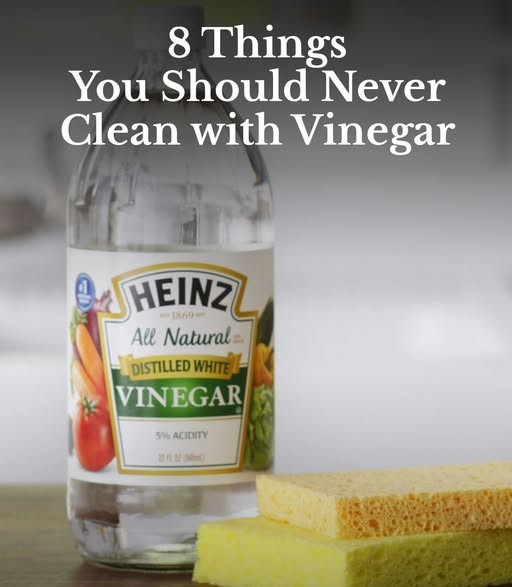ADVERTISEMENT
8 Things You Should Never Clean with Vinegar – And What to Use Instead
Vinegar is often hailed as the superhero of natural cleaning. It’s affordable, non-toxic, and incredibly effective at cutting through grease, dissolving mineral deposits, and neutralizing odors. But while vinegar is great for many household tasks, it’s not always the right choice. In fact, using it on the wrong surfaces can do more harm than good—sometimes causing permanent damage.
Before you reach for that spray bottle, make sure you’re not using vinegar on any of these 8 things you should never clean with it. Trust us—your countertops, appliances, and wallet will thank you.
🧼 1. Natural Stone Surfaces (Marble, Granite, Limestone)
Why not?
Vinegar is highly acidic, and when used on natural stone, it can etch, dull, or pit the surface, stripping away the protective sealant over time.
What to use instead:
A pH-neutral stone cleaner or a simple mix of warm water and a mild dish soap. Wipe with a soft cloth and dry immediately to avoid water spots.
🚿 2. Grout (Especially Unsealed Grout)
Why not?
While vinegar is often recommended for cleaning tile, using it on unsealed grout can break it down over time. The acid erodes the material, leading to crumbling and discoloration.
What to use instead:
Use a baking soda paste and a soft brush. For tougher stains, try an oxygen bleach cleaner that’s safe for grout.
🪟 3. Electronic Screens (TVs, Phones, Laptops)
Why not?
The acetic acid in vinegar can damage anti-glare coatings on screens and seep into the electronics, leading to malfunction.
What to use instead:
A microfiber cloth lightly dampened with water or a screen-safe cleaner. Never spray directly on the screen—apply to the cloth first.
🚗 4. Car Dashboard or Interior Screens
Why not?
Vinegar can strip the protective layer from touch screens and make dashboard materials brittle or discolored.
What to use instead:
Use an automotive-safe interior cleaner or a gentle water and mild soap solution with a soft microfiber cloth.
🧽 5. Rubber Parts (Like Seals on Appliances)
Why not?
Over time, vinegar can corrode rubber, making it brittle and prone to cracking—especially in washing machines, dishwashers, and refrigerator seals.
What to use instead:
